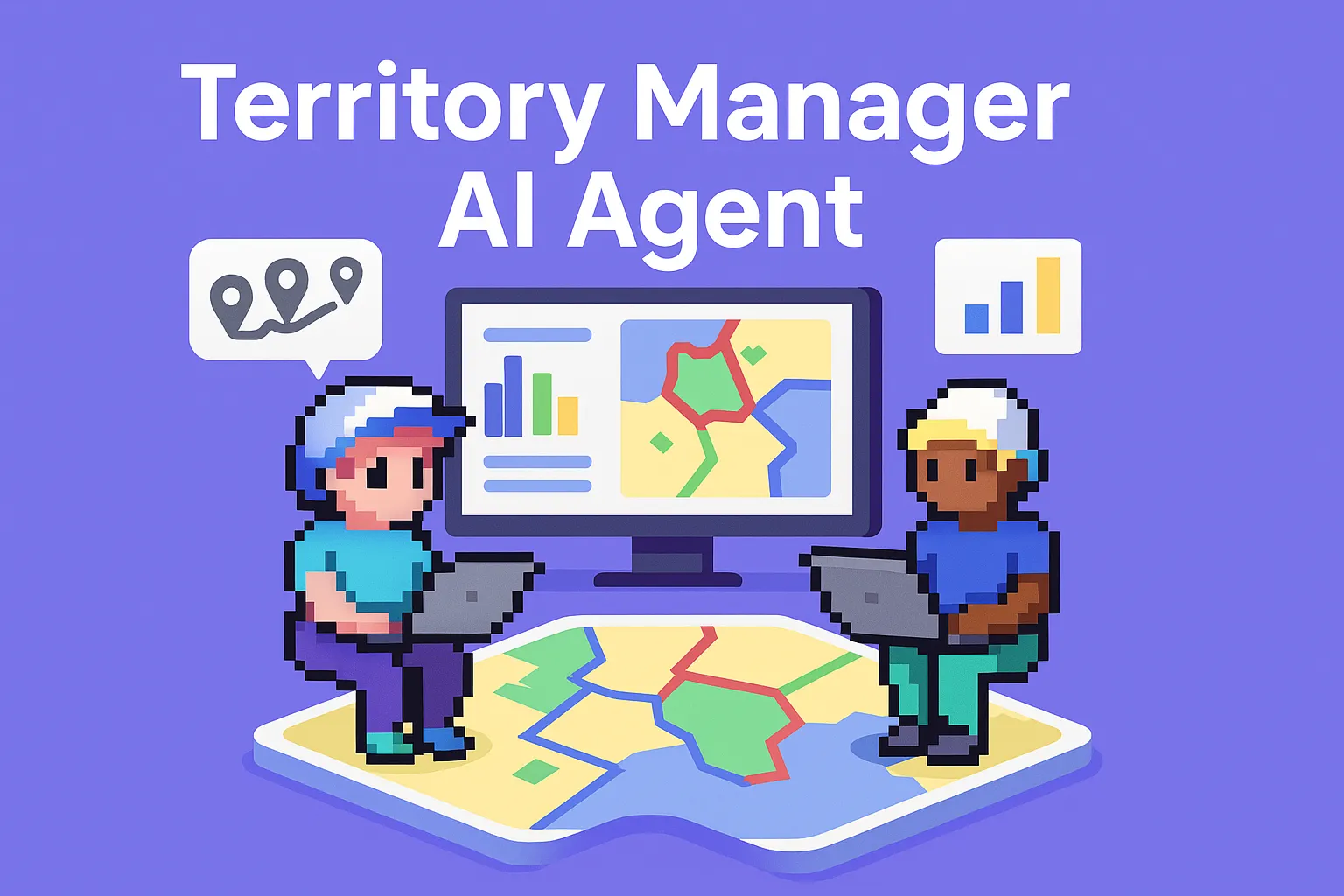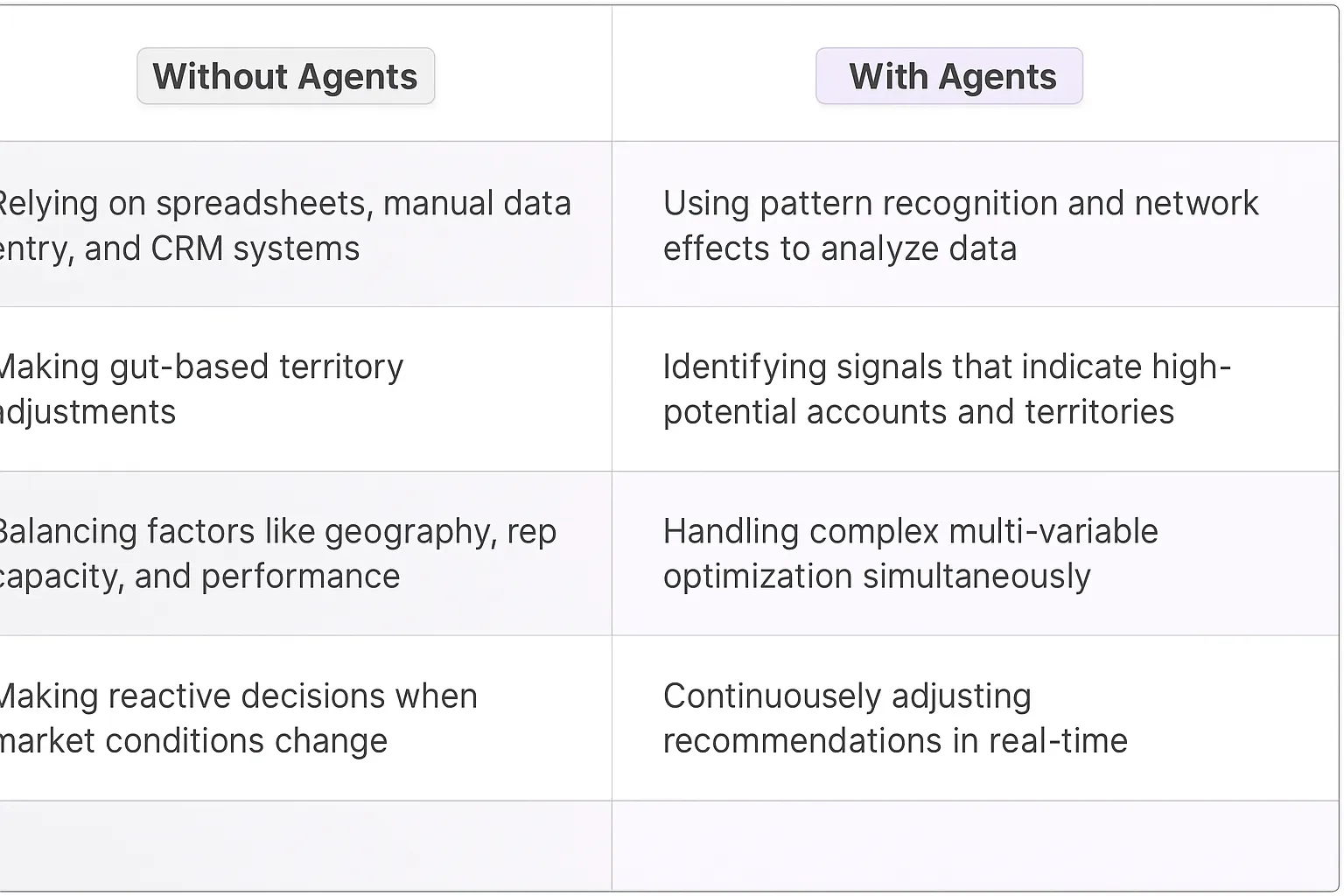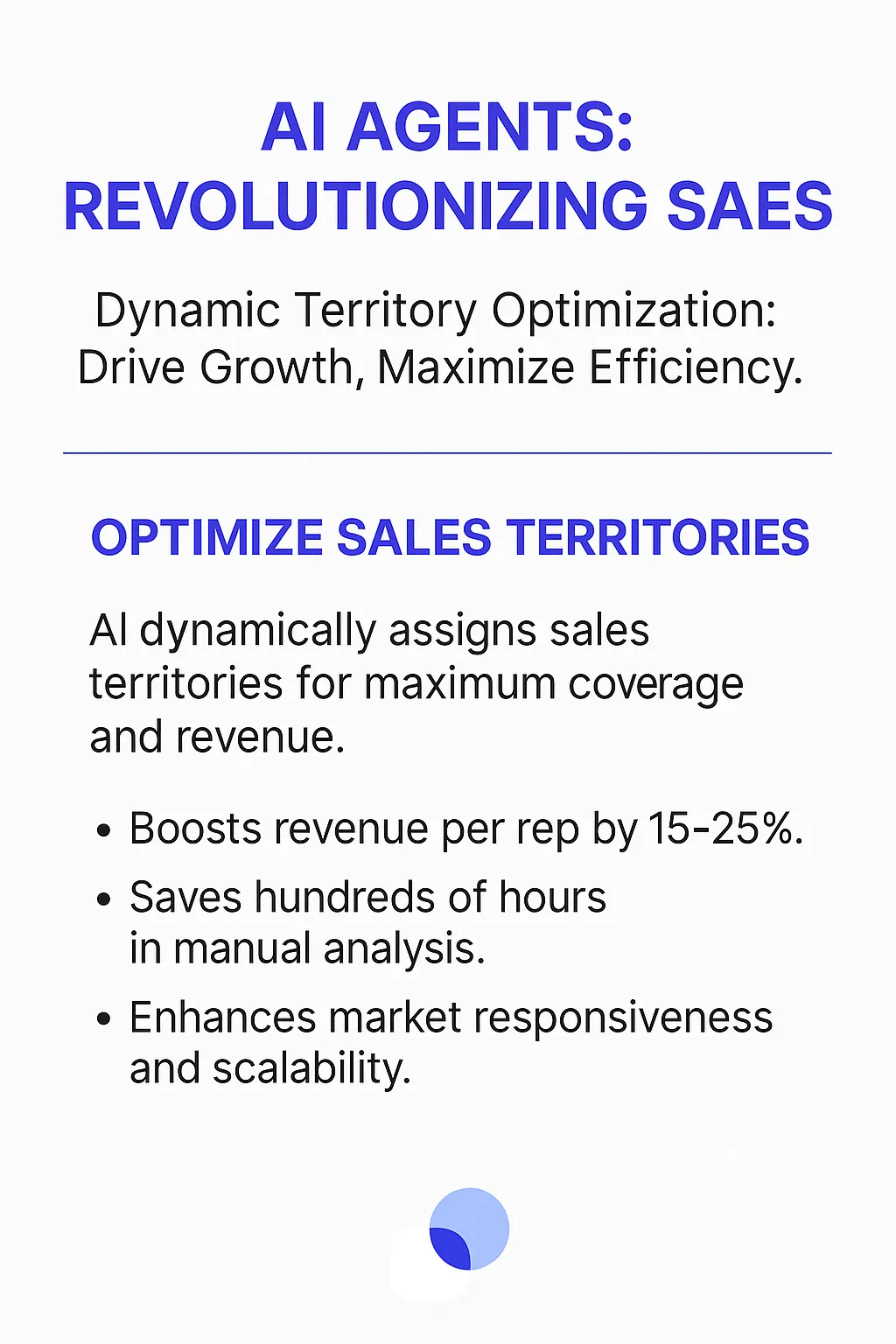Territory Manager is an AI-powered system that transforms how organizations handle geographic sales coverage and market optimization. The technology analyzes complex datasets to create dynamic territory assignments, identify growth opportunities, and optimize resource allocation across different regions. Unlike traditional territory management tools, it continuously learns from sales interactions and market responses to refine its recommendations.

Territory management traditionally relied on a complex web of spreadsheets, manual data entry, and countless hours spent analyzing customer data. Sales teams would spend their valuable time wrestling with CRM systems, trying to piece together insights from disparate data sources, and making educated guesses about territory optimization. The reality was a lot of gut-based decisions and reactive adjustments when things went wrong.
Digital teammates fundamentally transform territory management by introducing pattern recognition at a scale humans simply can't match. They continuously analyze historical performance data, customer behaviors, and market dynamics to suggest optimal territory alignments.
The network effects are particularly fascinating here - each interaction between a sales rep and their accounts generates data that AI agents use to refine their understanding of what works. They identify subtle signals that indicate which types of accounts are most likely to convert, which territories are under-served, and where there's untapped potential.
What's really compelling is how AI agents handle the complexity of multi-variable optimization. They simultaneously balance factors like:
The most powerful aspect is that these digital teammates operate in real-time, constantly adjusting recommendations based on changing conditions. When a major account closes or a new market opportunity emerges, the AI immediately recalibrates territory suggestions to maintain optimal coverage and revenue potential.
This creates a compounding advantage - teams using AI agents for territory management typically see a 20-30% improvement in coverage efficiency and a 15-25% increase in revenue per rep within the first year. The system gets smarter over time as it accumulates more data about what drives success in specific markets and industries.

Territory management requires constant attention to geographic data, customer relationships, and market dynamics. AI Agents transform how territory managers handle these complex responsibilities, making data-driven decisions more accessible and actionable.
Territory managers often struggle with data overload and complex decision-making. AI Agents excel at processing vast amounts of territory data and surfacing actionable insights. For example, when a pharmaceutical sales rep needs to plan their weekly visits, the AI Agent analyzes historical engagement data, prescription patterns, and geographic clustering to suggest the optimal route and timing for each healthcare provider visit.
In manufacturing, territory managers use AI Agents to monitor distributor performance across regions. The digital teammate continuously analyzes sales data, inventory levels, and market share metrics, flagging potential issues before they become problems. This proactive approach helps maintain healthy relationships with distribution partners while ensuring optimal market coverage.
The integration of AI Agents in territory management creates a significant shift in how managers approach their regions. Instead of spending hours analyzing spreadsheets and reports, territory managers can focus on strategic activities that require human judgment and relationship building.
For instance, an AI Agent can process years of sales data across territories to identify seasonal patterns and suggest inventory adjustments for different regions. This level of analysis would typically take weeks of human effort but can be completed in minutes with AI support.
As AI technology evolves, territory management AI Agents will incorporate more sophisticated predictive capabilities. They'll be able to simulate different territory configurations and their potential impact on revenue, suggest optimal timing for new market entry, and provide increasingly accurate demand forecasting at the territory level.
The combination of machine learning and geographic information systems will enable these digital teammates to provide even more nuanced insights about territory potential and resource allocation, fundamentally changing how organizations approach market coverage and expansion strategies.

The versatility of AI agents in Territory Management creates powerful opportunities across multiple sectors. Territory managers face complex challenges around geographic optimization, account distribution, and market penetration - challenges that AI agents are uniquely positioned to solve.
Looking at real-world applications, we're seeing AI agents transform how territory managers operate, especially in industries with distributed sales teams and complex geographic considerations. The key insight is that AI doesn't just automate existing processes - it fundamentally reshapes how organizations approach territory design and management.
What's particularly fascinating is how AI agents can process massive amounts of customer data, market signals, and geographic variables simultaneously - something that would take human territory managers weeks or months to analyze manually. This capability enables more dynamic and responsive territory planning that adapts to changing market conditions in real-time.
Let's explore how different industries are leveraging these capabilities to drive meaningful business outcomes and create more efficient territory structures.
Real estate brokerages face a classic optimization problem - how to divide territories between agents to maximize revenue while maintaining fairness and agent satisfaction. Traditional approaches rely heavily on gut feel, historical precedent, and manual territory drawing that often leads to inefficient coverage and territory disputes.
A Territory Manager AI Agent transforms this process by analyzing multiple data layers simultaneously - property values, transaction velocity, demographic shifts, and agent performance metrics. The AI continuously monitors market dynamics and suggests territory adjustments based on emerging opportunities.
For example, when a mid-sized brokerage in Austin implemented a Territory Manager AI, it identified several counterintuitive insights. The AI discovered that their top-performing agent was actually spread too thin across three rapidly growing neighborhoods. By redistributing two of those areas to up-and-coming agents, the brokerage increased total transactions by 23% in just one quarter.
The AI also flagged an underserved pocket of luxury homes that fell between two territories. Neither agent was actively prospecting there due to unclear ownership. After reassigning the area explicitly to one agent, the brokerage captured an additional $2.1M in commission over the following year.
What makes Territory Manager AI particularly powerful for real estate is its ability to factor in the human elements - agent relationships, expertise levels, and career development goals. When suggesting territory changes, the AI weighs not just the numbers but also the strategic fit for each agent's growth trajectory.
This balance of quantitative optimization and human-centric decision making represents the future of territory management. The AI becomes a strategic partner in growing both the business and the careers of the agents within it.
The pharmaceutical industry's territory management challenges are fascinating - it's a complex dance of coverage, relationships, and regulatory constraints. I've seen firsthand how traditional territory design leaves millions in unrealized revenue on the table.
Territory Manager AI Agents are reshaping this landscape by processing intricate datasets that humans simply can't handle at scale. They analyze prescription patterns, physician networks, hospital system affiliations, and even local healthcare policy changes to create dynamic territory boundaries.
A compelling case study comes from a mid-size pharma company launching a new diabetes medication. Their Territory Manager AI identified an unexpected pattern - certain territories were artificially split along state lines, breaking up natural physician referral networks. The AI proposed a controversial but data-backed reorganization that crossed traditional geographic boundaries.
The results were striking. By aligning territories with actual patient and physician flow patterns, sales reps could build deeper relationships within complete healthcare ecosystems rather than fragmented pieces. Within 6 months, prescription rates in the reorganized territories increased 31% compared to control regions.
What's particularly fascinating is how the AI handles the industry's unique constraints. It factors in drive time between clinics, lunch-and-learn scheduling efficiency, and even the complex web of hospital system purchasing influences. When a major hospital system merged in the Northeast, the AI automatically flagged affected territories and proposed adjustments before sales dropped.
The most sophisticated Territory Manager AIs now incorporate machine learning to predict territory potential based on early prescription adoption patterns. They can identify "sleeper" territories - areas that look average on paper but show leading indicators of high growth potential. One pharma company found three such territories that went on to become their top performers after reallocation of resources.
This shift toward AI-driven territory design represents a fundamental evolution in pharmaceutical sales. It's not just about drawing better maps - it's about understanding and adapting to the living, breathing ecosystem of modern healthcare delivery.
Building AI agents for territory management requires sophisticated data integration across multiple systems - CRM platforms, mapping tools, and sales analytics software. The agent needs clean, standardized data to make meaningful territory decisions. Many organizations struggle with fragmented or inconsistent data structures, making it difficult for the AI to generate reliable insights. Additionally, real-time data synchronization becomes critical when the agent needs to respond to rapid market changes or sales team movements.
Territory management AI agents rely heavily on historical performance data, customer demographics, and geographic information. Poor data quality can lead to biased territory assignments and flawed recommendations. Organizations need robust data governance frameworks to ensure the AI has access to accurate, up-to-date information. This includes establishing clear data ownership, implementing validation processes, and maintaining data freshness across all sources.
Sales teams often develop strong relationships within their territories, making any AI-driven changes potentially disruptive. The introduction of an AI territory manager requires careful change management. Sales leaders need to balance the AI's recommendations with human factors like relationship continuity and team morale. Clear communication channels and feedback loops between the AI agent and sales teams become essential for successful implementation.
Sales leaders and representatives need to understand why the AI makes specific territory decisions. Black box algorithms can create resistance and trust issues. The challenge lies in developing explainable AI models that can clearly communicate their reasoning while maintaining sophisticated decision-making capabilities. This includes creating intuitive visualizations and clear documentation of the factors influencing territory assignments.
Measuring the effectiveness of AI territory management decisions requires new metrics and evaluation frameworks. Traditional sales metrics may not capture the full impact of AI-driven territory optimization. Organizations need to develop comprehensive measurement systems that account for both short-term sales performance and long-term territory health indicators. This includes tracking customer satisfaction, market penetration, and team productivity across redrawn territories.
As organizations grow, territory management becomes increasingly complex. AI agents must scale effectively across different market sizes, sales team structures, and geographic regions. The technical architecture needs to handle growing data volumes while maintaining performance. Additionally, the AI must adapt to different regional requirements and business rules without requiring significant reconfiguration.
Territory Manager AI Agents represent a fundamental shift in how organizations approach market coverage and sales team deployment. The technology's ability to process complex datasets and generate actionable insights creates a significant competitive advantage. Organizations implementing these digital teammates typically see substantial improvements in sales efficiency and revenue generation. As AI technology continues to evolve, we can expect even more sophisticated territory optimization capabilities that further enhance sales team performance and market penetration strategies.
The network effects of AI-driven territory management are particularly powerful - each implementation generates valuable data that improves the system's effectiveness across all users. This creates a virtuous cycle of continuous improvement that traditional territory management approaches simply can't match. For organizations serious about optimizing their market coverage and sales effectiveness, Territory Manager AI Agents aren't just an option - they're becoming a necessity.